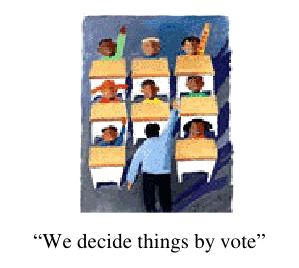Read the Previous Principle, Read the Next Principle, or Return to table of contents
Principle 5: Decisions are made by vote.

How many students have their hands up in the drawing? How many do not have their hands up? What do you think they are doing? Sometimes it is hard to know how to decide what to do. One day in a classroom some kids said, “Let’s play ball,” and others
said, “Let’s build a fort.” Some didn’t want to play ball or build a fort. They wanted to
go for a walk and maybe catch some interesting insects. The teacher said they had to pick just one activity for the entire class to do. How could they decide? Maybe they should do what the rich kids want to do. Maybe they could have fist fights and then let the winners choose their favorite activity. Or, they could let the oldest, or perhaps the
smartest, children choose their favorite activity. Do you like any of those ways of
choosing the activity? Very often it does not feel good to decide things by who has the
most money, or who is the smartest, or the best fighter. When a decision needs to be
made in a democracy, we vote. What are the children in the drawing doing? Do you
think they are voting? When we use voting as a way to make decisions we avoid
bloodshed and we hear from all groups in the society. Voting is the way we make
decisions in a democracy.
Story:
“Ok, come along now,” Elena said, “we have some decisions to make, and we’ll make
them right after supper.” They followed her back into house and then got busy with the
others on the afternoon chores. Petra wondered as she worked that afternoon what
decisions had to be made, if it involved her and Nadesh and how would the decisions be
made. She had visions of Nadesh having to arm wrestle the other boys to see if the two
of them could win the right to stay here and live at Elena’s. Then she had other images in
her head. Maybe they would be asked to draw straws to see if they got to stay—you
know, short straw loses, long straw wins. But, she would just have to wait and see.
When the afternoon’s work was done and the evening meal out of the way, Petra was in
for a surprise. Elena announced that it was time to decide if the group would let Nadesh
and Petra stay for a long time, or just let them rest up a few days and then send them on
their way. But the big surprise was that Petra saw no straws at all and no one was
preparing to arm wrestle. Instead it was quite civilized. Here is what happened.
Elena simply said, “Let’s vote. All in favor of letting them stay a long time raise your
right hand.” Almost everyone held up their hand! Wow! Marvelous! Whether or not
they stayed had simply been put to a vote—and they won!
“That’s it, we ... we...get...to stay...?” stammered Nadesh. He looked shocked and
happy all at once.
“Yes,” Elena said. “That’s how we decide things in a democracy, and Big Tree Land is a
democracy you know.” She grinned. “We voted and it passed. You’ve won! You can
stay!” To be continued....
Activity: List 2 enjoyable activities on the board. Make sure the area is free of obstacles. Pick up a book and hold it in your hand. Then, without forewarning, say, “I am not sure which activity we will do, so, whoever gets this book out of my hand first gets to say what we will do!” There may be a surprised silence, and then someone (or several) will rush forward and grab the book from your hand. In mock upset, the teacher says, “So and so got here first, so we have to do what he/she wants!” “Do you children think this is a good way to decide?” Encourage them to express their displeasure with this method of choosing. Then, “Well, we can try to decide another way. We will let the three people with the longest hair make the decision.” Pretend to be serious and walk around the room trying to see who the three people with the longest hair are. “We must see who has the longest hair so they can decide our activity.” Soon someone will point out that this way is not a good way either. Ask if the other students like this method. Encourage discussion. Why is it not a good way? Who does it favor? (Only the people with long hair) Does it feel good to always have some people get their way and others not? Explain
that it is true that not everyone will get what they wanted. But, in a democracy, the way we make the decision is as fair and as painless as possible. In a democracy we decide things by vote, not force. Introduce the statement, “In a democracy we decide things by ballot—not by bullet.”
Read the Previous Principle, Read the Next Principle, or Return to table of contents